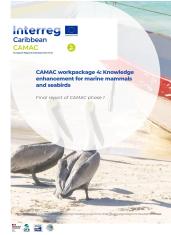Improving knowledge of marine mammals and seabirds
regional monitoring protocols
Marine experts in the Greater Caribbean region have long stressed the need to improve knowledge and strengthen regional collaboration on marine mammal populations and their monitoring. The same applies to seabirds, for which knowledge in the Caribbean and the Guianas is still very limited and essentially confined to breeding colonies.
The development of abundance and distribution maps for the species has been identified as a priority in the SPAW protocol action plan for the conservation of marine mammals in the Caribbean. This information is essential for assessing their conservation status and the areas of overlap between the species and human activities.
A lack of knowledge about species
Although they enthusiastically mobilise scientists, MPA managers, NGOs and many interested citizens throughout the Caribbean, scientific monitoring initiatives on marine mammals in the region are often very local and uneven between territories. Several countries list species that only concern them, and have only witness accounts and stranding data as sources of information. In this context, regional assessment of the conservation status of marine mammals remains imprecise. Some species may be exposed to higher risks than previously thought.
In order to encourage a regional assessment of species and promote their long-term monitoring, regional cooperation aimed at developing surveys in areas lacking in data and resources is crucial.
As for seabirds, the current monitoring context and the needs expressed by stakeholders are similar to those for marine mammals. Although initiatives do exist, they are not widespread, and knowledge of the use of the marine habitat by birds for certain behaviours such as feeding is almost non-existent in the region.
Seabird specialists recommend focusing research efforts on identifying feeding areas, which are often located offshore and may interact with fisheries or oil platforms.
An action plan to overcome the problem
Within phase 1 of the CAMAC project (2023), work on workpackage 4 has been highly collaborative, focusing on the formation of a regional working group and consultation with stakeholders in a variety of ways.
Over 43 marine mammal experts and 6 seabird experts from 20 countries or territories in the Caribbean and Guyana participated throughout the year in the working group and the two main workshops.
Their work helped to define the appropriate monitoring methods to be put in place:
- A boat transect campaign with an acoustic component consisting of a towed hydrophone to inventory marine mammal and bird species;
- A seabird monitoring programme to improve knowledge of offshore feeding grounds that could interact with human activities.
Priority areas have also been defined by the experts. As CAMAC's geographical area is particularly vast, it would not be possible to carry out surveys over its entire perimeter. These sectors have been defined according to several criteria, such as areas where there are existing threats, areas that play a functional role for species or areas where a stakeholder is willing to implement campaigns.
To find out more about the protocols and zones defined, consult the documentation

Report: Knowledge enhancement for marine mammals and seabirds
Consult the report on field actions planned to improve knowledge of marine mammals and seabirds in the Caribbean


